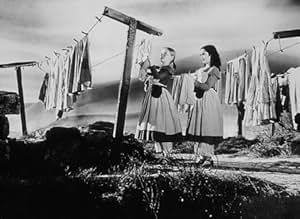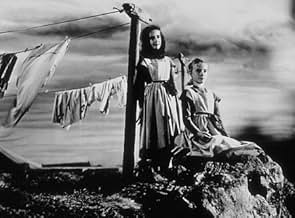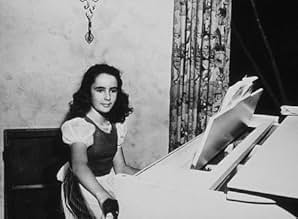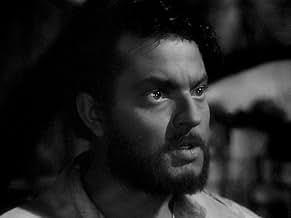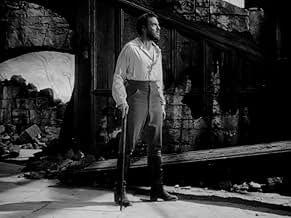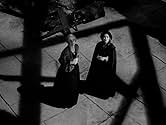Après une enfance difficile, l'orpheline Jane Eyre est engagée par Edward Rochester, le seigneur maussade d'un mystérieux manoir, pour s'occuper de sa jeune fille.Après une enfance difficile, l'orpheline Jane Eyre est engagée par Edward Rochester, le seigneur maussade d'un mystérieux manoir, pour s'occuper de sa jeune fille.Après une enfance difficile, l'orpheline Jane Eyre est engagée par Edward Rochester, le seigneur maussade d'un mystérieux manoir, pour s'occuper de sa jeune fille.
- Mason
- (uncredited)
- Guard
- (uncredited)
- Bookie
- (uncredited)
- Townsman
- (uncredited)
- Woman at Party
- (uncredited)
- Proprietor
- (uncredited)
Histoire
Le saviez-vous
- AnecdotesAfter securing the screen rights, David O. Selznick originally approached Orson Welles to play the role of Rochester opposite Selznick contractee Joan Fontaine. He got Aldous Huxley, John Houseman, and Robert Stevenson involved. Ultimately though, he sold the package to Darryl F. Zanuck and Twentieth Century Fox.
- GaffesThe text of "Jane Eyre, Chapter 1" that appears on screen does not correspond to the text of Bronte's novel. Chapter 1 actually opens, "There was no possibility of taking a walk that day. We had been wandering, indeed, in the leafless shrubbery an hour in the morning; but since dinner (Mrs. Reed, when there was no company, dined early) the cold winter wind had brought with it clouds so sombre, and a rain so penetrating, that further out-door exercise was now out of the question."
- Citations
[first lines]
Jane Eyre: [narrating] My name is Jane Eyre... I was born in 1820, a harsh time of change in England. Money and position seemed all that mattered. Charity was a cold and disagreeable word. Religion too often wore a mask of bigotry and cruelty. There was no proper place for the poor or the unfortunate. I had no father or mother, brother or sister. As a child I lived with my aunt, Mrs. Reed of Gateshead Hall. I do not remember that she ever spoke one kind word to me.
- Autres versionsThere is an Italian edition of this film on DVD, distributed by DNA srl, "JANE EYRE (1943) + LETTER FROM AN UNKNOWN WOMAN (1948)" (2 Films on a single DVD), re-edited with the contribution of film historian Riccardo Cusin. This version is also available for streaming on some platforms.
- ConnexionsFeatured in AFI Life Achievement Award: A Tribute to Orson Welles (1975)
Yet when it's not reminding us that it's at heart a version of something else, it's a very good film, falling not too far short of David Lean's "Oliver Twist" - which it resembles. Both films were shot almost entirely in the studio, yet don't feel studio-bound; they feel rather as though the directors had managed to find unusually claustrophobic out-of-door (or, in Lean's case, urban) locations. In both films a portion of every frame is consumed by impenetrable shadow. (Yet "Eyre" is detailed, and makes the best possible use of every frame.) Both films take place around in a callous England of the 1920s. (I got the impression that if Brönte's characters had for some reason gone to London they would have encountered Dickens's, although this impression was destroyed when the rich Londoners visit Rochester's castle.) Both films manage to be sentimental in an agreeable way. Both have excellent musical scores. In fact, this may be Herrmann's best score of the 1940s, certainly better than the one he wrote for "Citizen Kane", which is seems better than it is because the film as a whole is a masterpiece.
If you can, make sure you see a print with a pristine soundtrack. Orson Welles isn't always easy to understand.
- Spleen
- 15 févr. 2002
- Lien permanent
Meilleurs choix
Détails
- Date de sortie
- Pays d’origine
- Site officiel
- Langue
- Aussi connu sous le nom de
- Alma rebelde
- Lieux de tournage
- société de production
- Consultez plus de crédits d'entreprise sur IMDbPro
Box-office
- Budget
- 1 705 000 $ US (estimation)
- Durée1 heure 37 minutes
- Couleur
- Rapport de forme
- 1.37 : 1
Contribuer à cette page



